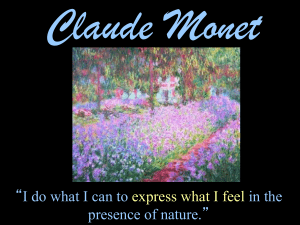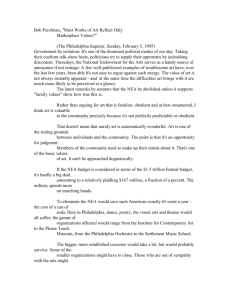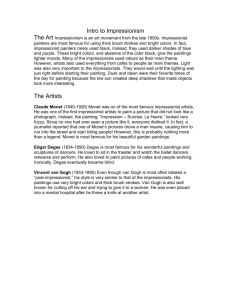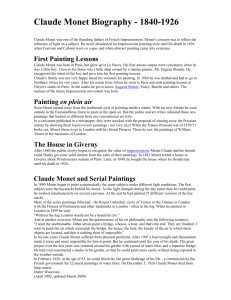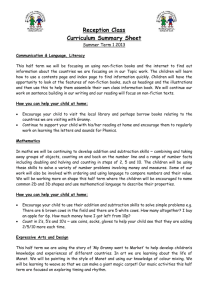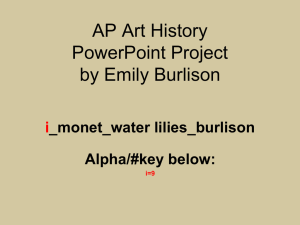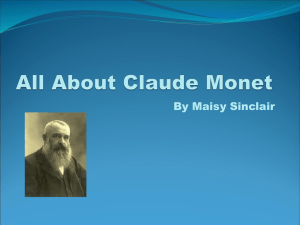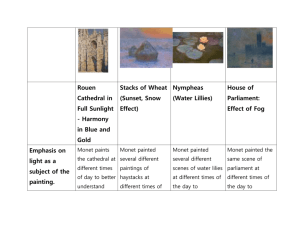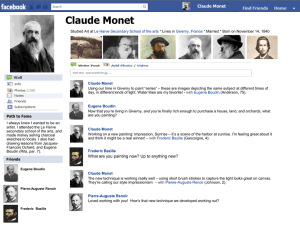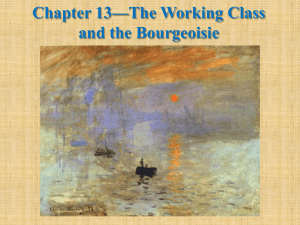Art Essay 1000 word essay about a modern artist who lived
advertisement
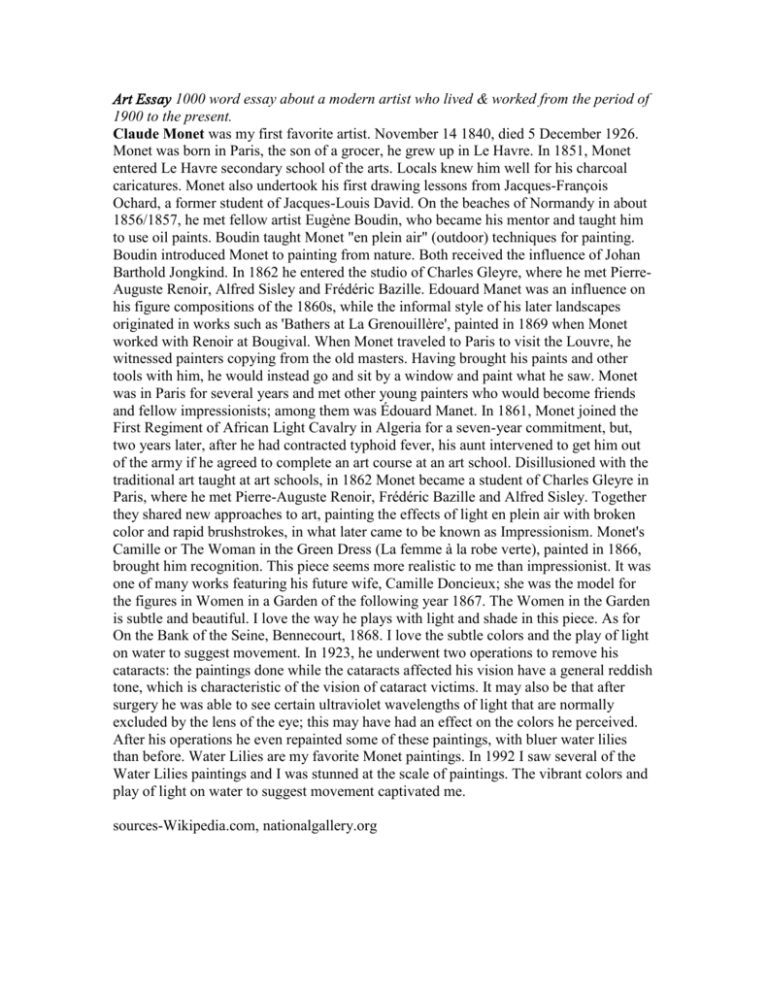
Art Essay 1000 word essay about a modern artist who lived & worked from the period of 1900 to the present. Claude Monet was my first favorite artist. November 14 1840, died 5 December 1926. Monet was born in Paris, the son of a grocer, he grew up in Le Havre. In 1851, Monet entered Le Havre secondary school of the arts. Locals knew him well for his charcoal caricatures. Monet also undertook his first drawing lessons from Jacques-François Ochard, a former student of Jacques-Louis David. On the beaches of Normandy in about 1856/1857, he met fellow artist Eugène Boudin, who became his mentor and taught him to use oil paints. Boudin taught Monet "en plein air" (outdoor) techniques for painting. Boudin introduced Monet to painting from nature. Both received the influence of Johan Barthold Jongkind. In 1862 he entered the studio of Charles Gleyre, where he met PierreAuguste Renoir, Alfred Sisley and Frédéric Bazille. Edouard Manet was an influence on his figure compositions of the 1860s, while the informal style of his later landscapes originated in works such as 'Bathers at La Grenouillère', painted in 1869 when Monet worked with Renoir at Bougival. When Monet traveled to Paris to visit the Louvre, he witnessed painters copying from the old masters. Having brought his paints and other tools with him, he would instead go and sit by a window and paint what he saw. Monet was in Paris for several years and met other young painters who would become friends and fellow impressionists; among them was Édouard Manet. In 1861, Monet joined the First Regiment of African Light Cavalry in Algeria for a seven-year commitment, but, two years later, after he had contracted typhoid fever, his aunt intervened to get him out of the army if he agreed to complete an art course at an art school. Disillusioned with the traditional art taught at art schools, in 1862 Monet became a student of Charles Gleyre in Paris, where he met Pierre-Auguste Renoir, Frédéric Bazille and Alfred Sisley. Together they shared new approaches to art, painting the effects of light en plein air with broken color and rapid brushstrokes, in what later came to be known as Impressionism. Monet's Camille or The Woman in the Green Dress (La femme à la robe verte), painted in 1866, brought him recognition. This piece seems more realistic to me than impressionist. It was one of many works featuring his future wife, Camille Doncieux; she was the model for the figures in Women in a Garden of the following year 1867. The Women in the Garden is subtle and beautiful. I love the way he plays with light and shade in this piece. As for On the Bank of the Seine, Bennecourt, 1868. I love the subtle colors and the play of light on water to suggest movement. In 1923, he underwent two operations to remove his cataracts: the paintings done while the cataracts affected his vision have a general reddish tone, which is characteristic of the vision of cataract victims. It may also be that after surgery he was able to see certain ultraviolet wavelengths of light that are normally excluded by the lens of the eye; this may have had an effect on the colors he perceived. After his operations he even repainted some of these paintings, with bluer water lilies than before. Water Lilies are my favorite Monet paintings. In 1992 I saw several of the Water Lilies paintings and I was stunned at the scale of paintings. The vibrant colors and play of light on water to suggest movement captivated me. sources-Wikipedia.com, nationalgallery.org QuickTime™ and a decompressor are needed to see this picture. Monet’s Camillie Woman in Green Dress Monet Bathers at La Grenouillere Claude Monet Women in the Garden QuickTime™ and a decompressor are needed to see this picture. QuickTime™ and a decompressor are needed to see this picture. Monet Women in the Garden QuickTime™ and a decompressor are needed to see this picture. Monet Water lily pond QuickTime™ and a decompressor are needed to see this picture. Monet on the Bank of Seine at Bennecourt
